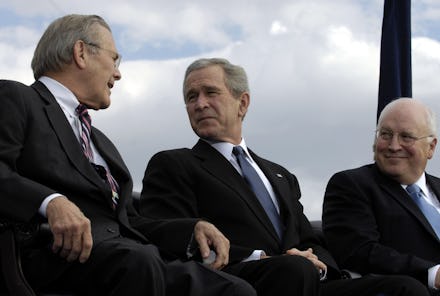'Days Of Fire' Reveals Bush Administration Was "Looking For Somebody's Ass to Kick"

Peter Baker, chief White House correspondent for the New York Times, has just released a new book on the Bush years entitled Days of Fire: Bush and Cheney in the White House. As the title suggests, the book focuses on the relationship between the former president and vice president, and their relationships with the rest of the White House.
An excerpt came out this weekend in the New York Times Magazine. Within, Baker discusses the rising disagreements between Bush and Cheney, which toward the end were over everything from the bailout plan to the last-minute pardon of Scooter Libby, Cheney's chief of staff who infamously leaked the identity of undercover CIA agent Valerie Plame to the press. Throughout the second term, according to Baker, Cheney and Rumsfeld (who resigned after six years as defense secretary) waned in influence as Condoleeza Rice gradually became one of Bush's more trusted lieutenants.
Here's a particular quote that caught Politico's eye: a senior Bush official said, "The only reason we went into Iraq, I tell people now, is we were looking for somebody's ass to kick. Afghanistan was too easy." Other former Bush administration officials also discussed feeling off-the-record regret for the invasion of Iraq.
Bush and his former advisers are seeing their "War President" legacy come together. Since August, Errol Morris' intimate and confrontational new documentary on Donald Rumsfeld, The Unknown Known, has been touring the festival circuit. Rumsfeld, like Bush and Cheney, continues to stand by his decisions as Secretary of Defense. See more in the clip below:
Millennials can finally see a clear narrative of the Bush years come together. It's our generation who has had to fight these wars, and we've been watching the fallout like a slow-motion train wreck for over a decade now. We need to see why and how powerful people made drastic mistakes like pushing for the invasion of Iraq and our protracted engagement in Afghanistan, especially so that we don't subject future generations to more awful decisions.